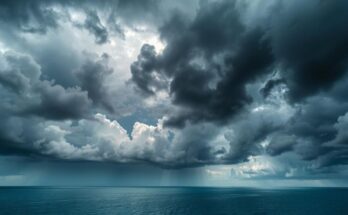Tropical Cyclone Alfred, the first cyclone in over 50 years for Queensland and New South Wales, is approaching Australia’s east coast, prompting evacuations. Expected to make landfall as a Category 2 storm, it could bring damaging winds of 155 km/h and significant rainfall, risking life-threatening flash flooding. Authorities stress the rarity and seriousness of this cyclone, urging prompt action from residents.
Australia’s eastern coast is facing the impending arrival of Tropical Cyclone Alfred, the first cyclone to impact Queensland and New South Wales in over fifty years. Authorities have advised millions of residents, especially those living in flood-prone areas, to evacuate in anticipation of dangerous conditions. The Bureau of Meteorology has issued storm warnings spanning more than 500 kilometers (311 miles) of coastline, predicting wind speeds up to 155 kilometers per hour (96 miles per hour).
The cyclone is projected to make landfall as a Category 2 storm early Friday morning near Brisbane, a major city with a population of 2.5 million and the capital of Queensland. Forecasts indicate that rainfall could reach as high as 800 millimeters (31.5 inches) in some regions, significantly surpassing March’s average. Authorities stress that this could trigger life-threatening flash flooding, heightening concerns among local residents.
Queensland Premier David Crisafulli characterized this event as exceptionally rare for southeast Queensland, noting the long interval since the last cyclone occurred in the region in 1974. The last near-miss for Brisbane was in 1990, further underlining the significance of this impending storm. Crisafulli has emphasized the importance of following evacuation directives to ensure public safety.
Crisafulli articulated the severity of the situation, stating, “If it was the case that this [cyclone], which has strengthened, was to cross on high tide in the middle of the night, and you’re in that storm surge, the last place you want to be is in your home. So, now’s the time [to evacuate].” Additionally, Australian Prime Minister Anthony Albanese has pledged to provide necessary resources for state-led rescue operations.
New South Wales Premier Chris Minns urged residents to prepare for a challenging 48 hours, particularly in areas forecasted to experience flooding. He highlighted the Northern Rivers community’s struggle, having previously faced devastating floods in 2022. Minns said, “The Northern Rivers [community] has gone through hell over the last few years.”
Experts predict that Cyclone Alfred may notably impact regions south of the storm’s eye, affecting popular tourist destinations from the Gold Coast to northern New South Wales. In preparation, thousands of individuals have evacuated their homes, with authorities rapidly establishing evacuation centers. Supermarkets are experiencing significant demand, with essential supplies being depleted, and reports indicate a shortage of sandbags.
Tropical Cyclone Alfred poses a significant threat to Australia’s east coast, marking the first cyclone in this region since 1974. With severe weather warnings issued and evacuation directives in place, millions are urged to take the situation seriously. Authorities are mobilizing resources to safeguard residents, especially in vulnerable areas prone to flooding. The continuing response will be crucial as the storm approaches landfall.
Original Source: www.aljazeera.com




